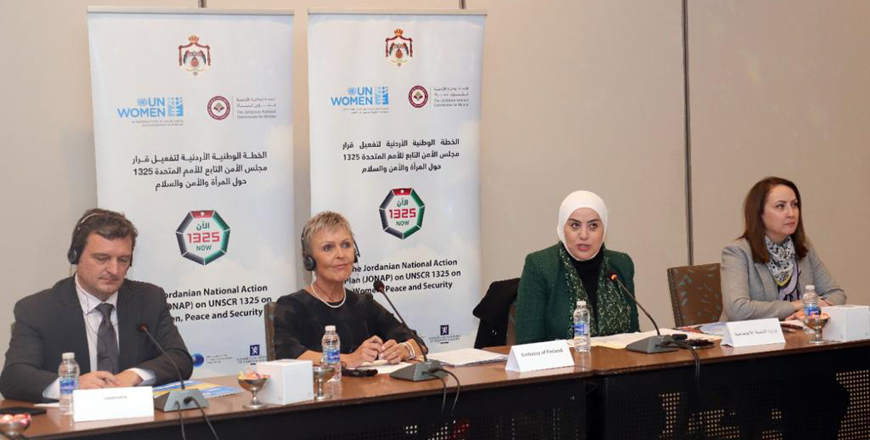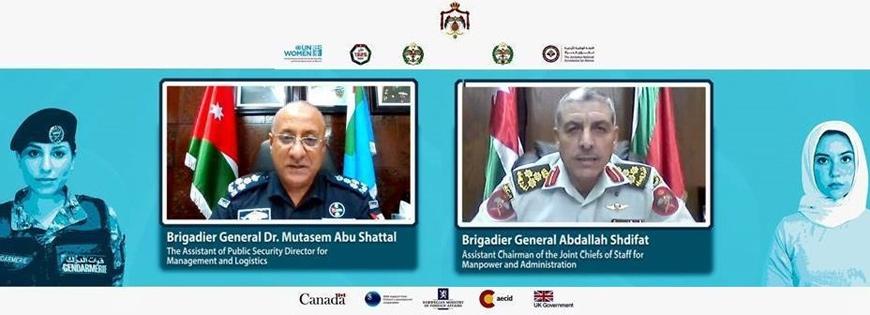You are here
Bani Mustafa chairs meeting on UNSCR 1325 on Women, Peace and Security
By JT - Nov 14,2022 - Last updated at Nov 14,2022

Minister of Social Development and Chairman of the Inter-Ministerial Committee on Women’s Empowerment Wafaa Bani Mustafa and other speakers during the 5th meeting of the Jordanian National Action Plan for advancing the implementation of UN Security Council Resolution 1325 on Women, Peace and Security on Monday (Petra photo)
AMMAN — Minister of Social Development and Chairman of the Inter-Ministerial Committee (IMC) on Women’s Empowerment Wafaa Bani Mustafa on Monday chaired the 5th meeting of the Jordanian National Action Plan (JONAP) for advancing the implementation of UN Security Council Resolution (UNSCR) 1325 on Women, Peace and Security.
The meeting, attended by JONAP Secretary General Maha Ali, Finnish Ambassador to Jordan and Representative of the Donor Consortium Supporting JONAP implementation Anne Meskanen, the UN Resident Representative in Jordan Nicholas Burnett, and representatives of embassies and supporting bodies, aims to discuss the second phase of the national plan to activate UNSCR 1325 on Women, Peace and Security for the years 2022-2025, the Jordan News Agency, Petra, reported.
In her speech, Bani Mustafa stressed the importance of Jordan's role, given its important geopolitical position, in addressing regional crises, whether through conflict resolution, building peace and providing support to refugees.
During the meeting, which was organised by the IMC and UN Women, she noted that Jordan has achieved progress on the Women, Security and Peace Index for the years 2021-2022, ranking 127 after it was ranked 129 in 2019.
Bani Mustafa highlighted the need for women, peace and security funding programmes to encourage gender equality.
She also underlined the importance of ensuring meaningful participation of women on an equal footing with men in all peace building processes and strengthening their leadership role.
She also referred to the economic security of women, the importance of their access to resources and other basic services as well as the protection and promotion of women’s human rights amid conflicts and crises.
The minister commended the role of civil organisations in setting the agenda of the national plan.
Referring to IMC’s recommendations, the minister stressed the importance of providing sleep facilities for females working in the southern and eastern military regions, establishing nurseries to provide a more suitable work environment for women working in the security sector, creating a witness protection programme under Article (6/b/5) of the Protection from Domestic Violence Law No.15 of 2017.
In turn, Ali said that the first phase of JONAP included increased women's participation in security forces and police, judicial bodies and peacekeeping forces.
Ali pointed out that the second phase of the plan focuses on bolstering communication, enhancing knowledge about gender, strengthening training plans and tackling climate issues.
Meskanen lauded the outcomes of the plan’s first phase, stressing the importance of the second phase in increasing the presence of women in leadership positions.
Meskanen praised the role of ministries, government institutions and civil organisations in implementing the first phase of the national plan, noting the importance of cooperation and communication to reach better results.
Related Articles
AMMAN — The Jordanian National Commission for Women (JNCW) has held a symposium titled “Jordan-US Women Dialogue on Women, Peace and S
AMMAN — The Chairperson of the Inter-Ministerial Committee on Women’s Empowerment, Minister of Parliamentary and Political Affairs Musa Maay
AMMAN — To mark the 20th anniversary of the United Nations Security Council Resolution (UNSCR) 1325 on Women, Peace and Security, the Jordan















